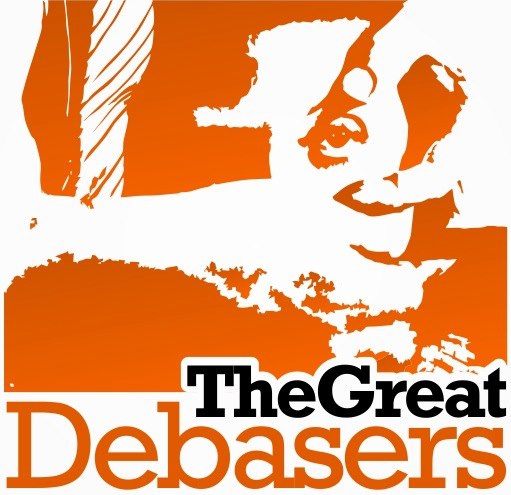
Have you guys checked out my friend Will’s new podcast? You should! It’s called The Great Debasers [which may or may not be a song lyric] and the premise is Will and his friend Jeremy re-watch movies that they originally saw in their teens and then talk about where they were when they first saw it, what they remembered, how it was different this time around, etc. It’s a great listen, especially if you’re a guy in your late 20’s and were into American movies/film culture in the late 90’s/early 00’s. But really it’s for everybody! In the latest episode (#7) I give my well-rehearsed dossier of the Ligeti-Kubrik relationship (a subject which well-nigh obsessed me around 2003, probably when I first saw this movie.)
Anyhoo, I’ve been doing some other re-watching lately, with Cincinnati friends: re-watching all the Disney Animated Classics, one by one. Here are my assorted thoughts on the project so far, in order of the re-watched:
The Little Mermaid

Totally maintained it’s status as the best Disney feature in my mind. Great songs (to which I still half-remembered the words), engrossing plot. Lots of gags that went over my head on childhood viewings cracked me up this time. The animation style was a big surprise though: seen from this post-Pixar world, it looks REALLY old. Not that that’s a bad thing. In a lot of ways, TLM struck me as the last in the line of the great hand-animated Disney productions. But it was crazy – this movie could just as well have been animated in the 1950’s.
One thing I had TOTALLY forgotten, but which came as a pleasant surprise: Sebastian the crab is a self-styled conductor/composer! Given the number of times I watched this movie as a kid (and given that he was my favorite character) I seriously think this may have had an influence on the path my life/career has taken. This time around, my favorite character was Ursula.
Of all the great tunes in this movie, what’s my favorite? The accordion jig on the boat. I am seriously not even joking right now. It’s a beaut’!
Beauty and the Beast
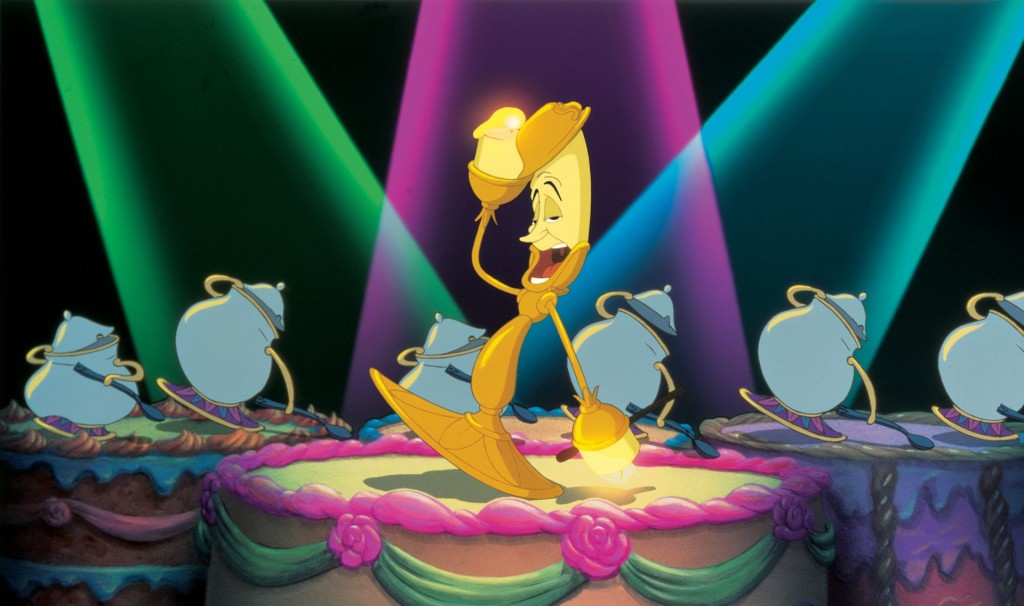
God I love Angela Landsbury. And Maurice Ravel. But it didn’t really make sense that she (Angela) played Chip’s mother – she should have been his grandmother. But I guess that would have led to all sorts of questions? I don’t know. The songs in this movie are pretty good, but maybe not at the level of TLM. The computer generated sets are cool and all, but I can’t help but feel the loss of the TLM animation style. This movie (combined with 101 Dalmations) surely provided The Simpsons with its best musical fodder. (“See my vest”)
Aladdin
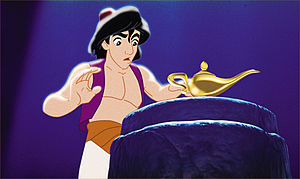
Aladdin is definitely the hottest of the Disney movie princes, and let us not forget that he was voiced by DJ’s boyfriend from Full House. I had forgotten just how few songs there were in this score. It’s really just Robin Williams’ gimmick song and “A Whole New World”. Which, there’s nothing wrong with that exactly, but it sort of misses the point of the musical, and the movie dragged for me at points. I forgot about Gilbert Godfried as the wise-cracking bird. (Which, it turns out, is part of a long tradition in the Disney movies of hilarious animal sidekicks.)
The Lion King

Eh. I remembered liking this one a lot more as a kid. Shit is dark! Jeremy Irons, good on you. [Speaking of The Simpsons: anagrams, anyone?] Again, there’s barely a song to be heard in this movie! It’s really just “Hakuna Matata” and “Circle of Life” theme song. Question: is there a subliminal message about the inevitability of corruption in this movie? Does “The Circle of Life” implicitly include the destitution/coercive power dynamics/enacted psychoses of the Scar administration? Must it? Musn’t it? I think maybe. (But maybe I’ve just been reading this book too much lately.)
Lady and the Tramp

Sucked. Seriously, I was really surprised. It’s just a bunch of little vignettes, threaded through with the thinnest of plots. The spaghetti scene is memorable, yes, but that’s about it.
101 Dalmations
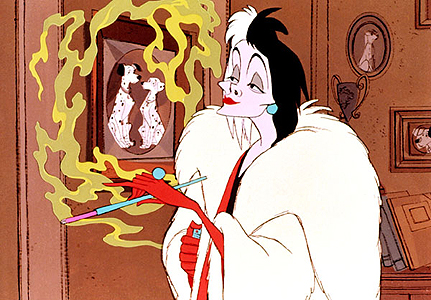
Really enjoyed this one. Great English character actors in some of the minor dog roles. Or maybe they weren’t even really English – I questioned an accent or two – but they were great characters at least. Again, it came as a surprise how little music there was in this one, but Cruella de Vil (both the character and the song) is an absolute winner. In fact, I think CdV may be my favorite character in the Disney cannon. This movie dragged a little though. A solid effort, if not my very favorite. (Also great Simpsons fodder.)
Sleeping Beauty
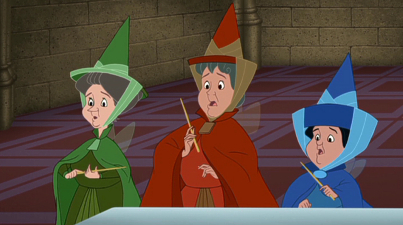
I really just love this score. So 50’s, so choral (btw, almost all of these movies, including the more recent ones, have unabashèd choral finales in their scores.) You can NOT go wrong with George Bruns, I’m telling you. His incorporation of and variation upon the original Tchaikovsky ballet score is so masterful, and makes a mockery of Clint Mansell and Matt Dunkley’s adaptation of “Swan Lake” in Black Swan (which movie was a mockery of so very much anyway.)